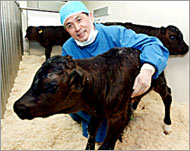S Korea clone pioneer quits in shame
South Korean cloning pioneer Hwang Woo-suk has publicly apologised for what he called shameful lapses of ethics in his work.

Speaking at a news conference in Seoul on Thursday at which he announced his resignation, he admitted two female scientists in his lab donated their own eggs for research.
Under international guidelines, scientists are advised to be cautious when using human subjects for research who are in a dependent relationship with them – a precaution against exploitation.
The announcement comes as a major setback for Hwang’s work that has raised worldwide hopes for cures for untreatable diseases.
“I am very sorry that I have to tell the public words that are too shameful and horrible,” Hwang said, appearing downcast and solemn.
“I should be here reporting the successful results of our research, but I’m sorry instead to have to apologise.”
Resignation
Hwang also said he would resign as head of the World Stem Cell Hub “to atone to the public”.
The hub, launched last month in Seoul along with international researchers, aims to be a centre seeking treatments for now-incurable diseases.
The foundation had announced plans to open cloning centres in San Francisco and London, but Hwang’s US collaborators, including University of Pittsburgh researcher Gerald Schatten, have dropped out of the project following allegations of unethical egg collection.
 |
|
A trained veterinarian, Hwang is |
A trained veterinarian, Hwang is a national hero in South Korea and has gained international renown for his breakthroughs, including cloning the world’s first human embryos and extracting stem cells from them.
Earlier this year, he unveiled the world’s first cloned dog.
Hwang said he would continue his research at Seoul National University.
“The responsibility for all disputes and controversy lies on me,” Hwang said. “I will not make any excuse.”
The Health Ministry said earlier Thursday that an ethics investigation at the university found the two junior scientists gave their own eggs for research.
However, the ministry said the donations weren’t in violation of ethics guidelines because they were made voluntarily.
‘Painful lesson’
“I have learned a painful lesson that I should conduct research in a calm and cautious manner by living up to a global standard,” Hwang said.
|
“I have learned a painful lesson that I should conduct research in a calm and cautious manner by living up to a global standard.” |
In a separate development on Thursday, South Korea’s Health Ministry also confirmed that a doctor who had earlier been collecting eggs for Hwang’s research paid some women for their eggs, and that Hwang had recently been made aware of that.
Hwang said he had asked the doctor about the source of the eggs and was told not to worry about it and continue his work.
The payments to egg donors ended in 2003 and were not illegal at the time. However, Hwang has previously insisted that all eggs obtained for his research were made by donors
who gave them in hopes of helping his work.
Earlier this year, a new South Korean law took effect banning commercial trading of human eggs.